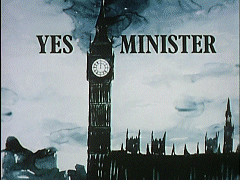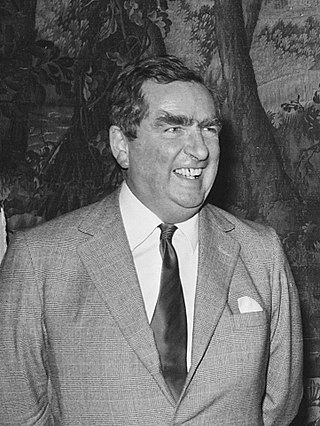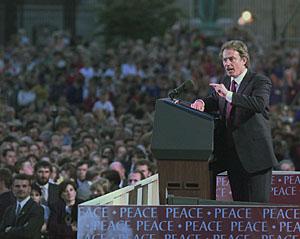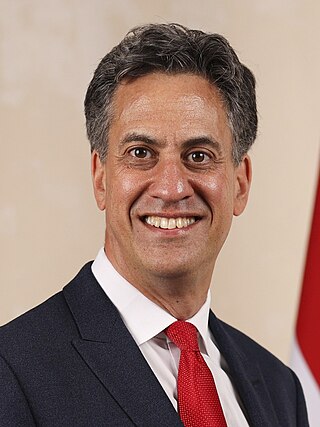
The 2001 United Kingdom general election was held on Thursday 7 June 2001, four years after the previous election on 1 May 1997, to elect 659 members to the House of Commons. The governing Labour Party led by the prime minister Tony Blair was re-elected to serve a second term in government with another landslide victory with a 165-seat majority, returning 412 members of Parliament versus 418 from the previous election, a net loss of six seats, although with a significantly lower turnout than before—59.4%, compared to 71.6% at the previous election.

Margaret Hilda Thatcher, Baroness Thatcher, was a British stateswoman and Conservative politician who served as Prime Minister of the United Kingdom from 1979 to 1990 and Leader of the Conservative Party from 1975 to 1990. She was the longest-serving British prime minister of the 20th century and the first woman to hold the position. As prime minister, she implemented economic policies known as Thatcherism. A Soviet journalist dubbed her the "Iron Lady", a nickname that became associated with her uncompromising politics and leadership style.

Bottom is a British sitcom created by Rik Mayall and Adrian Edmondson that ran for three series on BBC2 from 1991 to 1995. It focuses on Richard "Richie" Richard (Mayall) and Edward Elizabeth "Eddie" Hitler (Edmondson), two unemployed, crude, and perverted flatmates living in Hammersmith, London, who aspire to better themselves. Bottom became known for its chaotic, nihilistic humour and violent slapstick comedy. In 2004, Bottom was ranked 45th in a BBC poll for Britain's Best Sitcom.

Yes Minister is a British political satire sitcom written by Antony Jay and Jonathan Lynn. Comprising three seven-episode series, it was first transmitted on BBC2 from 1980 to 1984. A sequel, Yes, Prime Minister, ran for 16 episodes from 1986 to 1988. All but one of the episodes lasted half an hour, and almost all ended with a variation of the title of the series spoken as the answer to a question posed by Minister Jim Hacker. Several episodes were adapted for BBC Radio; the series also spawned a 2010 stage play that led to a new television series on Gold in 2013.

John Smith was a Scottish politician who was Leader of the Opposition and Leader of the Labour Party from July 1992 until his death in May 1994. He was also Member of Parliament (MP) for Monklands East.

Denis Winston Healey, Baron Healey was a British Labour Party politician who served as Chancellor of the Exchequer from 1974 to 1979 and as Secretary of State for Defence from 1964 to 1970; he remains the longest-serving Defence Secretary to date. He was a Member of Parliament from 1952 to 1992, and was Deputy Leader of the Labour Party from 1980 to 1983. To the public at large, Healey became well known for his bushy eyebrows, his avuncular manner and his creative turns of phrase.

The Young Ones is a British sitcom written by Rik Mayall, Ben Elton, and Lise Mayer, starring Adrian Edmondson, Mayall, Nigel Planer, Christopher Ryan, and Alexei Sayle, and broadcast on BBC2 for two series, first shown in 1982 and 1984. The show focused on the lives of four dissimilar students and their landlord's family on different plots that often included anarchic, offbeat, surreal humour. The show often included slapstick gags, visual humour and surreal jokes sometimes acted out by puppets, with each episode also featuring a notable selection of guest stars and musical numbers from various performers.

New Labour is the political philosophy that dominated the history of the British Labour Party from the mid-late 1990s to 2010 under the leadership of Tony Blair and Gordon Brown. The term originated in a conference slogan first used by the party in 1994, later seen in a draft manifesto which was published in 1996 and titled New Labour, New Life for Britain. It was presented as the brand of a newly reformed party that had altered the old Clause IV and instead endorsed market economics. The branding was extensively used while the party was in government between 1997 and 2010. New Labour was influenced by the political thinking of Anthony Crosland and the leadership of Blair and Brown as well as Peter Mandelson and Alastair Campbell's media campaigning. The political philosophy of New Labour was influenced by the party's development of Anthony Giddens' Third Way which attempted to provide a synthesis between capitalism and socialism. The party emphasised the importance of social justice, rather than equality, emphasising the need for equal opportunity and believed in the use of markets to deliver economic efficiency and social justice.
The Comic Strip are a group of British comedians who came to prominence in the 1980s. They are known for their television series The Comic Strip Presents..., which was labelled as a pioneering example of the alternative comedy scene. The core members are Adrian Edmondson, Dawn French, Rik Mayall, Nigel Planer, Peter Richardson and Jennifer Saunders, with appearances by Keith Allen, Robbie Coltrane, Alexei Sayle and others.

In British politics, Blairism is the political ideology of Tony Blair, the former leader of the Labour Party and Prime Minister between 1997 and 2007, and those that support him, known as Blairites. It entered the New Penguin English Dictionary in 2000. Elements of the ideology include investment in public services, expansionary efforts in education to encourage social mobility, and increased actions in terms of mass surveillance alongside a ramping up of law enforcement powers, both of these latter changes advocated in the context of fighting organized crime and terrorism. Blairites have additionally been known for their contrast with the traditional support for socialism by those believing in left-wing politics, with Blair himself and others speaking out against the nationalisation of major industries and against also heavy regulations of business operations. On foreign policy, Blairism is supportive of close relations with the United States and liberal interventionism, including advocacy for both the Iraq war and the War in Afghanistan (2001–2021).

Richard Michael Mayall was an English actor, comedian and writer. He formed a close partnership with Adrian Edmondson while they were students at Manchester University, and was a pioneer of alternative comedy in the 1980s.

The New Statesman is a British sitcom made in the late 1980s and early 1990s satirising the United Kingdom's Conservative government of the period. It was written by Laurence Marks and Maurice Gran at the request of, and as a starring vehicle for, its principal actor Rik Mayall.

Edward Samuel Miliband is a British politician who has served as Secretary of State for Energy Security and Net Zero since July 2024. He has been Member of Parliament (MP) for Doncaster North since 2005. Miliband was Leader of the Labour Party and Leader of the Opposition from 2010 to 2015. Alongside his brother, David Miliband, he served in the Cabinet from 2007 to 2010 under Prime Minister Gordon Brown.

The Blair–Brown deal was a gentlemen's agreement struck between the British Labour Party politicians Tony Blair and Gordon Brown in 1994, while they were Shadow Home Secretary and Shadow Chancellor of the Exchequer respectively.

The Deal is a 2003 British television film directed by Stephen Frears from a script by Peter Morgan, based in part upon The Rivals by James Naughtie. The film depicts the Blair–Brown deal, a well-documented pact that Tony Blair and Gordon Brown made, whereby Brown would not stand in the 1994 Labour Party leadership election, so that Blair could have a clear run at becoming leader of the party and later Prime Minister instead. The film begins in 1983, as Blair and Brown were first elected to Parliament, and ends in 1994 at the Granita restaurant—the location of the supposed agreement—with a brief epilogue following the leadership contest.

The modern political history of the United Kingdom (1979–present) began when Margaret Thatcher gained power in 1979, giving rise to 18 years of Conservative government. Victory in the Falklands War (1982) and the government's strong opposition to trade unions helped lead the Conservative Party to another three terms in government. Thatcher initially pursued monetarist policies and went on to privatise many of Britain's nationalised companies such as British Telecom, British Gas Corporation, British Airways and British Steel Corporation. She kept the National Health Service. The controversial "poll tax" to fund local government was unpopular, and the Conservatives removed Thatcher as prime minister in 1990, although Michael Heseltine, the minister who did much to undermine her, did not personally benefit from her being ousted.

The United Kingdom Alternative Vote referendum, also known as the UK-wide referendum on the Parliamentary voting system was held on Thursday 5 May 2011 in the United Kingdom to choose the method of electing MPs at subsequent general elections. It occurred as a provision of the Conservative–Liberal Democrat coalition agreement drawn up in 2010 and also indirectly in the aftermath of the 2009 expenses scandal. It operated under the provisions of the Parliamentary Voting System and Constituencies Act 2011 and was the first national referendum to be held under provisions laid out in the Political Parties, Elections and Referendums Act 2000. Many local elections were also held on this day.

NOtoAV was a political campaign in the United Kingdom whose purpose was to persuade the public to vote against the Alternative Vote (AV) in the referendum on 5 May 2011. The opposition to switching to AV was successful, with the "No" vote to switching to AV receiving 67.9% of votes cast in the 2011 referendum.
The Hunt for Tony Blair is a one-off episode of The Comic Strip Presents..., a British television comedy, which was first shown on Channel 4 on 14 October 2011. The 49-minute film was written by Peter Richardson and Pete Richens and presented in the style of a 1950s film noir. It stars Stephen Mangan as the former British prime minister Tony Blair, who is wanted for murder and on the run as a fugitive from justice. The film received its world premiere at the Edinburgh International Television Festival in August 2011. It first aired on Channel 4 on 14 October 2011; it received a mostly positive reaction from reviewers, and was nominated for a BAFTA award and the British Comedy Awards.
















